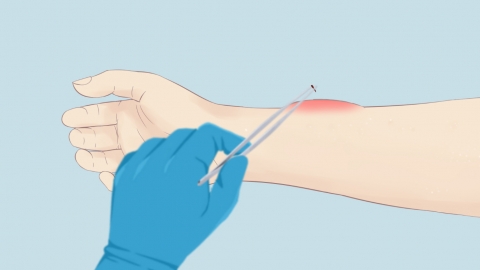What to do if stung by a wasp
After being stung by a wasp, localized symptoms such as pain, swelling, and itching may occur. Immediate actions usually include quickly moving away from the swarm, removing the stinger, washing the wound, applying cold compresses, and seeking medical treatment. A detailed explanation is as follows:

1. Leave the swarm immediately: After being stung by a wasp, the first step is to quickly move away from the swarm to avoid further stings. Find a safe place to hide and ensure personal safety.
2. Remove the stinger: The wasp's stinger often remains embedded in the skin and should be promptly removed. It can be gently scraped off using a fingernail or a flat-edged object like a credit card. Avoid squeezing the stinger with fingers, as this may cause more venom to be released into the body.
3. Wash the wound: Use warm water and soap or running clean water to rinse the sting area thoroughly, which helps remove bacteria around the wound and prevent infection. Additionally, because wasp venom is alkaline, acidic substances such as vinegar, white vinegar, or lemon juice can be applied to help neutralize the toxin.
4. Apply a cold compress: After being stung by a wasp, an ice pack or a cold, wet towel can be applied to the affected area to relieve pain and swelling. Cold compresses can be repeated multiple times to reduce capillary dilation and blood flow, thereby slowing down the spread of the venom.
5. Medical treatment: If the pain is severe or an allergic reaction occurs, seek medical attention promptly and follow the doctor's instructions for medication. Antiallergic drugs such as Cetirizine Hydrochloride Capsules or Desloratadine Oral Solution, anti-inflammatory drugs such as Penicillin V Potassium Tablets or Cefixime Granules, and analgesics such as Ibuprofen Suspension or Tramadol Hydrochloride Effervescent Granules may be used. Self-medication should be avoided to prevent delays in treatment due to improper management.
If severe discomfort symptoms such as nausea, vomiting, or dizziness occur after being stung by a wasp, or if the wound condition worsens, seek immediate medical attention. Doctors will perform treatments such as intravenous therapy or blood purification based on the patient's condition to reduce the damage caused by the toxins to the body.







